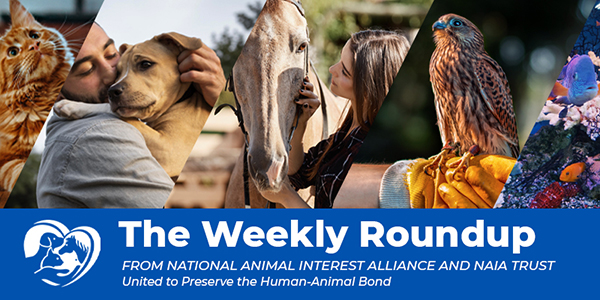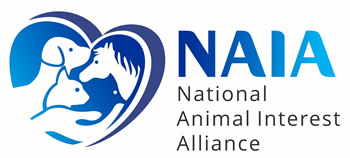
Inside This Issue:
- CDC Eases up on Planned Rule for Border-Crossing Dogs
- One Eviction and One Hundred Homeless Animals
- A Rat by Any Other Name... May Just Be Saved
- Woman Remains Hospitalized One Week After Horrific Dog Attack
- For Most Olympic Events, We're Lucky We Don't Have to Compete Against Animals!
CDC Eases up on Planned Rule for Border-Crossing Dogs

Well, well, well. Looks like we will be going to Canada this summer.
Pressure from myriad groups: pet owners, the dog sports community, rescues and shelters, veterinary agencies, service animal organizations, the International Airline Transport Association, Canadian government agencies, border state lawmakers, and others, has led the CDC to ease up on a new rule that would have made travel between the U.S. and Canada with a dog much more difficult.
The rule, which would have taken effect on August 1st, has been greatly simplified. Now, it states that if your dog has been in a low-risk/rabies-free country for at least the last six months, you just need to complete an import form and the dog needs to be microchipped. The chip is the most significant new requirement, and there are definitely some members of the dog community who won’t appreciate this. There are also accessibility issues with the import form that need to be ironed out. All that said, this is much less burdensome than before, and shows that the CDC is willing to listen to stakeholders, and adapt as it receives new information.
One Eviction and One Hundred Homeless Animals

Domesticated rabbits and the wild is a bad mix.
A rental home in Kentucky is now empty of its tenant and his 100 or more animals. According to a neighbor, what started out as a few random animals grew into an unmanaged, massive “collection” of all shapes and sizes – cats, dogs, goats, chickens, pigeons, rabbits, pigs, and even some horses. The tenant was arrested on drug and firearms charges, and is in county custody, as are many of the domesticated animals he was keeping. A number of chickens, rabbits, and pigeons were not taken in, however, and are considered “lost to the wild.”
The tenant’s animals were a well-known problem in his neighborhood. Some neighbors tried to help, while others hoped the problems would just go away. Even after the tenant’s arrest, most neighbors are afraid to talk to the news on camera, so it’s clear, even without reading the criminal charges, that there were serious issues here that go beyond animal care and welfare.
The owner of the property was left with a huge mess after the tenant’s arrest. The Bullitt County Animal Control office would also like to bring charges against him for leaving behind such a disaster for the owner to clean up. Whatever reasons drove the man to continue expanding his animal "collection" until long after the animals essentially took over his home are unclear. It’s easy to write it off as “Ah, another hoarder,” but it’s rarely that simple, and there are nearly always numerous factors at play. One thing, however, is certain: caring for these animals is now the community’s burden.
A Rat by Any Other Name... May Just Be Saved

Plains "mouse" or "rat" – otherwise known as a palyoora. Image: Tim Bawden, CC BY-SA 2.0, via Wikimedia Commons
Currently, nearly a third of Australia’s native rodents are extinct or threatened. This is due to a combination of issues you are no doubt familiar with: habitat loss, invasive species, and multiple environmental factors. Compounding this problem, according to ecologists, is the fact that the Australian public just doesn’t seem to care all that much about these species going extinct.
Part of this lack of concern may be tied to language: when the Aboriginal names of these species were replaced with European names, a whole lot of rodents – many of which are, frankly, quite adorable by human aesthetics – became “rats” of various types. For example, the yirrkoo was given the awkward and unflattering moniker of “false water rat.” Ew! Not the best marketing, folks!* More importantly, from a European perspective, rats are generally viewed as unwanted pests that spread disease and make you jump three feet in the air when one pops out of your cupboard (or toilet). In fact, just the word "rat" elicits a negative reaction. If you are fighting for finite conservation dollars, how much help do you think a dirty rat is going to receive?
One ecologist thinks that restoring these species’ Aboriginal names could help. These names don’t carry negative connotations, acknowledge Aboriginal cultures, and further, they would create an opening for discussion about the species – a great chance to promote and rebrand them. Research on how animal names can boost or reduce people’s desire to help them provide evidence that this approach could have a positive effect. Of course name changes alone won’t solve the issues these animals face, but garnering people’s attention and affection certainly can't hurt. And regardless of the outcome, you have to admit “palyoora” is just a lot less, uh, plain than “plains rat.”
---
*For an extreme example, the majaru or mayaroo, which is not a threatened species, was renamed the long-haired rat, and is casually referred to as the plague rat. Are we really gonna go there? In this case, "plague" refers to the animal's dramatic population explosions, as it isn't known for carrying diseases – but how many people actually know that? Lord help any critter with a name like "plague rat" if it ever needs conservation funding!
Woman Still Hospitalized One Week After Horrific Dog Attack
In Portland, Oregon, a woman who was brutally mauled last week by a pack of eight dogs as she walked past a homeless encampment is still hospitalized, fading in and out of consciousness. She lost an arm and ear from the attack and has already undergone multiple surgeries. She may still lose an eye and has an unfathomably long and painful recovery to look forward to.
This is just a horrific story all around. Stories like this are also part of why we always say the first and most important job of animal services isn’t sheltering animals or even animal welfare: it is public health and safety. A loose dog can be far worse than a mere nuisance – and when dogs form a pack, the danger is multiplied. It is vital that animal services have the resources and capability to quickly enforce animal ordinances that pertain to public safety.
We don’t discount the other aspects of the animal service mission. Helping homeless and mistreated animals is valuable. Public outreach and education are valuable. These things make for better, stronger communities, and it’s not like these important services can’t be carried out simultaneously alongside public health and safety. But first and foremost, people need to feel like they can take their pets for a walk without being attacked by a stray or uncontrolled dog. When that is not the case, it must change, and quickly.
For Most Olympic Events, We're Lucky We Don't Have to Compete Against Animals!
Citius, Altius, Fortius – Communiter! The 2024 Summer Olympics open this weekend in Paris, France. People – and animals – have been gathering and competing in the Olympics for ages. But have you ever wondered what today's Olympic Games would look like if humans had to compete against animals? That’s the mental exercise this IFL article puts us through, and it was, frankly, pretty fun to imagine.
As for the actual results – well, those would most likely be pretty lopsided, many of them going to team Non-Human. For starters, humans, despite our deadly skill as persistence hunters, aren’t exactly top-tier when it comes to attributes like speed, reflexes, and strength. A lot of animals are capable of wiping the floor with us in one, if not all of these areas. However we do have significant advantages when it comes to tool use and cooperation in team sports. It also no doubt helps that these games were designed and scored by humans, but we digress.
Anyhow, in case you are scoring these imaginary Olympics at home, the humans swept badminton, bicycling (sorry, Team Bear), and all the team events. Team Cheetah smoked humans in the sprint, though we fared a bit better in the long distance competitions. In the swimming events, fish and cetaceans are engaged in a highly-publicized boycott of this year’s Olympics, but that just opens up the contests for everybody else. Here, the penguins and seals made the humans look pretty silly – and imagine looking silly compared to a penguin! Meanwhile, in track and field, a yellow-footed rock-wallaby went home with both the long and high jump awards (take that, impalas!). And, thanks to the IOC allowing tool use, it was neck-and-neck between human and ape in the climbing competition. We’ll let your imagination fill in the winner on that one.
Moving on to feats of strength, an African bush elephant broke seven world records in lifting – with her trunk only! – while, tragically, humans won the gold in boxing after a kangaroo was disqualified for attempting to disembowel his opponent. You hate to see that, but you have to admit it was bound to happen.
Now go and enjoy your real Olympics, folks. And be thankful it’s humans-only… and that there are no proportional strength and distance competitions (only Team Beetle wants that).
Also in the News...
★ Cuyahoga County Animal Shelter slashes adoption fees amid high capacity (Shelters & Rescues; Adoption & Foster Opportunities)
★ Youth learn lifelong skills at Lincoln County Fair Dairy Goat Show (Human-Animal Bond; 4-H)
★ Macomb County rescue slammed with needy animals: ‘I don’t know if we’re going to pull out of this’ (Shelters & Rescues; Surrenders Up, Donations Down)
★ 3 ‘helpful’ things that are actually harmful to animals (Surprising Lists 1; When It's Cruel to be Kind)
★ It’s snow miracle: zookeepers in Phoenix surprise animals with icy wonderland (Zoos; Summer Care; Everyone Loves Bloodsicles)
★ Third dog death under investigation after stay at pet store in Virginia (Accusations & Investigations; Pet Deaths)
★ 22 Animals You Really Don’t Want to Mess With (Dangerous Lists; Raccoons Finally Getting Their Due)
Click here to see what is happening legislatively



